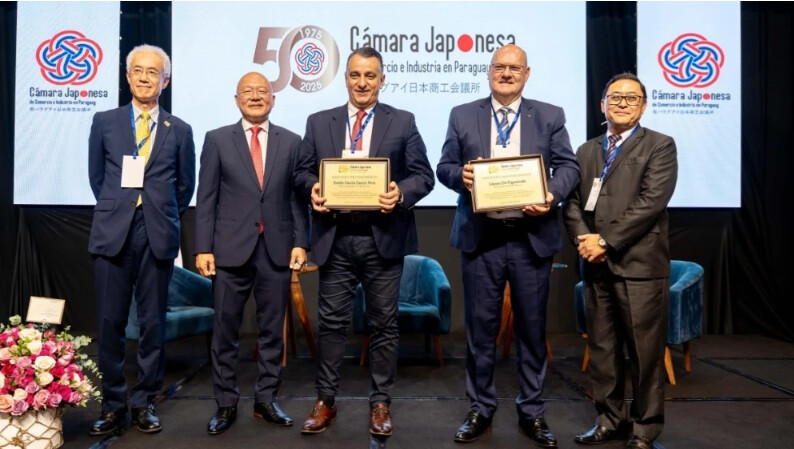
ASUNCIÓN, Paraguay - Top executives at Japanese automotive parts manufacturer Yazaki recently stated their belief that maquiladoras (assembly and processing plants in border regions) in Paraguay could emerge as potential beneficiaries of the ongoing trade conflict between the United States and China, highlighting the significant growth potential of Paraguay's automotive parts industry.
Lázaro De Figueiredo, CEO and President of Yazaki Mercosur, and Emilio García Neto, CEO and Vice President, made these remarks at a recent commemorative event celebrating the 50th anniversary of the Japanese Chamber of Commerce in Paraguay. They emphasized Paraguay's immense potential to strengthen its automotive parts sector, along with the favorable local environment that supports Yazaki's manufacturing operations.
Specifically, Mr. De Figueiredo noted that the tariff barriers arising from the US-China trade dispute could present new opportunities for regions like Mercosur. He suggested the European Union (EU) might increase its demand for products from the region, and expressed optimism about a potential future trade agreement with the United States. He analyzed that in this context, Paraguay's importance as an export hub could be further amplified.
Mr. De Figueiredo highly praised the resilience and potential of Paraguay's young workforce, explaining that Yazaki's investment decision in Paraguay was made after careful consideration and that the recruitment and training of young talent has led to successful outcomes. Yazaki established a wire harness factory in Mariano Roque Alonso 12 years ago and currently exports products to global automotive brands such as Toyota and Renault. He also revealed that Yazaki supplies 100% of the electrical circuits used in Tesla's electric vehicles.
He characterized the current trade disputes and tariff barriers as a temporary transitional period, noting that active efforts are underway to find alternatives for market restructuring. He expressed confidence that the trade environment will stabilize soon and anticipates positive trade relations between Paraguay and various countries, including the United States. Mr. De Figueiredo emphasized, "We are currently in a transitional period of seeking alternatives to adapt to the market, and we believe that Mercosur can further grow as an export hub. We trust in future agreements, and the European Union will need many products from our regional bloc. We are ready to meet their demands."
Meanwhile, Mr. García Neto stated that female employees constitute 60% of the workforce at the local Paraguayan plant, which currently employs 1,600 people with plans to expand to 2,000 by the end of the year. He highly valued the growth potential of employees, saying, "Many employees across Mercosur have started in production roles and now hold key positions such as plant managers."
Naoki Nagaoka, President of the Japanese Chamber of Commerce in Paraguay, underscored the chamber's crucial role in facilitating ongoing dialogue between Japanese and Paraguayan companies, stating that this has contributed to promoting investment, innovation, and joint development. He added, "We have continuously strived to build bridges of mutual understanding, not only in economic aspects but also in cultural aspects."
The trade friction between the US and China is causing significant shifts in global supply chains, and tariff barriers, in particular, are pressuring companies to re-evaluate their production bases and explore new markets. This situation can offer opportunities to new regions beyond traditional major production hubs, making the automotive parts industry in Mercosur countries like Paraguay noteworthy.
Paraguay possesses favorable conditions for the growth of its automotive parts industry, including relatively low labor costs, a young and skilled workforce, and government efforts to attract foreign investment. As seen in Yazaki's case, global automotive companies are already utilizing Paraguay as a production base, and this trend is likely to accelerate if the US-China trade conflict intensifies.
The European Union may also strengthen economic cooperation with the Mercosur region as it seeks to diversify its supply chains. Mercosur, with its abundant resources and production capacity, has the potential to meet the demands of the European market, and Paraguay can play a crucial role in this cooperation. Furthermore, if a trade agreement is reached with the United States, Paraguay's automotive parts industry could gain access to the North American market, providing even greater growth momentum.
Maquiladoras play a vital role in attracting foreign capital and technology to foster export-oriented manufacturing. Paraguay's maquiladora industry has grown primarily through economic cooperation with neighboring countries like Brazil and Argentina, with the automotive parts sector forming a key part of it. Investments from global companies like Yazaki bring various positive effects to the Paraguayan economy, including job creation, technology transfer, and increased exports.
In particular, the high percentage of female employees at Yazaki's Paraguay plant contributes to creating quality jobs for women, and continuous investment in employee training to enhance skills plays a significant role in strengthening the competitiveness of Paraguay's labor market. Additionally, cases of employees being promoted from production roles to management positions provide positive role models for young Paraguayans and create motivation for growth.
Combined with the external factor of the US-China trade conflict and Paraguay's inherent growth potential, the future of Paraguay's automotive parts industry looks promising. Through proactive government policies to attract investment, efforts to secure a skilled workforce, and the establishment of strategic partnerships with global companies, Paraguay has the potential to grow into a significant automotive parts production base in South America.
Yazaki's positive outlook supports this potential and raises expectations for the continued growth and development of Paraguay's automotive parts industry. It remains to be seen whether Paraguay can turn the crisis of the US-China trade conflict into an opportunity to achieve economic growth centered on the automotive parts sector.
[Copyright (c) Global Economic Times. All Rights Reserved.]



























